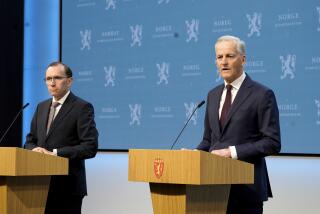Officials Say U.S. Will Recognize All 12 Soviet Republics : Diplomacy: Membership in the International Monetary Fund and World Bank will be recommended for some. Russia is choice for U.N. Security Council seat.
- Share via
WASHINGTON — President Bush plans to announce Thursday that the United States will recognize the independence of all 12 former Soviet republics and immediately establish formal diplomatic relations with six of them, Administration officials said Monday.
The Administration also is preparing to recommend full membership soon in the International Monetary Fund and World Bank for some of the republics, making them eligible for their first long-term financial aid from the West, a senior Treasury Department official said.
In addition, Bush has decided to support a request by the Russian Federation that it inherit the Soviet Union’s seat--and its veto power--in the U.N. Security Council, officials said.
The actions make it clear that the United States has accepted the dissolution of the Soviet Union and intends to deal with the 12 republics as fully independent countries.
Russia, Ukraine, Belarus, Kazakhstan--the four republics that have nuclear weapons on their territory--will be recognized as independent, sovereign countries, along with Kyrgyzstan (formerly Kirghizia) and Armenia, the officials said.
U.S. ambassadors will be appointed to each of the six.
But Uzbekistan, Turkmenistan, Tadzhikistan, Moldova, Georgia and Azerbaijan will not receive formal diplomatic recognition because their governments have not moved as far toward democracy and economic reform as the others, the officials added.
Robert S. Strauss, now U.S. ambassador to the Soviet Union, will become U.S. ambassador to Russia, one official said.
Sources said that Bush plans to announce the decision Thursday, although events could alter the timing. One source said that Bush was waiting for Soviet President Mikhail S. Gorbachev’s formal resignation before moving ahead, in part because he wants to avoid any appearance of disrespect for him.
Membership in the International Monetary Fund and World Bank hinges upon diplomatic recognition of the republics by major Western governments and certain technical details. But those are not seen as major obstacles.
“If recognition is forthcoming, I have no doubt that very shortly we will come out strongly in favor of membership for the republics,” a senior Treasury Department official said in an interview.
The leading candidates for early membership, he said, are the republics that are of the most strategic significance and show the most willingness to implement major economic reforms: Russia, Ukraine, Belarus and possibly Kazakhstan.
Membership in the international institutions is something that the Western allies--led by the United States--had staunchly denied Gorbachev’s government, despite his many pledges to transform the old Soviet Union to a market economy.
Although the Soviet Union had applied for full membership in the IMF and World Bank, it had been granted only a special associate status, giving it access to the expertise of the institutions but none of their financial resources. At last July’s economic summit in London, Western officials indicated that full membership for the Soviet Union was at least two years away.
Membership in the IMF and World Bank would be a major boost for the economically battered republics as they undertake their first painful economic reforms.
The new stance also represents a conclusion by Western governments that at least some of the individual republics stand a far better chance of economic revival now that they have broken away from the centralized government.
The IMF and World Bank make their funds available only to members that live up to strict goals, such as decontrolling prices, bringing inflation under control and slashing their budget deficits.
Thus, good standing in the institutions represents a seal of confidence that reassures commercial banks and other potential sources of financial support.
Although none of the republics has officially applied for membership, many have made no secret of their desire to belong. Already, at least eight have committed themselves to working out economic reform plans with the IMF by the end of March.
IMF spokesman Graham P. Newman confirmed that the recent political changes have made the issue of membership far simpler. “It is fairly safe to assume that (their applications) would be put on a fast track,” he said. “When one looked at the U. S. S. R. as a whole, that was a formidable challenge. Once you break it into its pieces, the job becomes somewhat easier.”
The Soviet Union’s status as one of the five permanent members of the U.N. Security Council, awarded to Moscow as one of the victors in World War II, gave it the right to veto any action by the council. The other permanent members are the United States, China, Britain and France.
The 11 Soviet republics that agreed Saturday to dissolve the Soviet Union also agreed that Russia should get the Security Council seat. Their decision avoided a potentially sticky diplomatic controversy. The United Nations can recognize Russia as “successor” to the old Soviet Union without formally amending the U.N. Charter. Awarding the seat to the new Commonwealth of Independent States might have required an amendment, since the Charter specifies that only “states” can be members.
The Bush Administration has been under pressure to recognize at least some of the republics since Dec. 1, when the people of Ukraine voted for independence. Russian President Boris N. Yeltsin made a personal appeal to Bush in a telephone call Monday to recognize his Russian Federation.
Secretary of State James A. Baker III and other officials had said that recognition would depend on the republics’ records of conducting free elections, moving toward free-market economic reforms, cooperating on efforts to ensure control of the Soviet nuclear arsenal and abiding by arms-control treaties and other international commitments made by the Soviet Union.
Times staff writers James Gerstenzang and Stanley Meisler contributed to this report.
More to Read
Sign up for Essential California
The most important California stories and recommendations in your inbox every morning.
You may occasionally receive promotional content from the Los Angeles Times.














